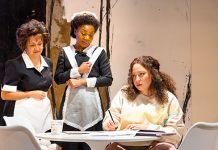By Gretchen C. Van Benthuysen |
American millionaires in the 21st century have changed. No longer are they a monolithic group of white Anglo-Saxon Protestants who disproportionately control social and financial power and trace their ancestry back to the Revolution.
They are post-Woodstock grandbabies of baby boomers who got a good education (or dropped out to create a start-up) and found success in jobs such as finance, the media, entertainment, and more recently the tech industry, and represent diverse ethnicities.
But they feel a bit guilty about it. They reject being a conspicuous consumer. That, they rationalize, is for the 1-percenters.
Playwright Karen Rizzo explores what happens when a rich couple – they call it “being comfortable” – tries to close the economic inequality gap between themselves and another couple in the East Coast premiere of the 90- minute play “Mutual Philanthropy,” directed by Evan Bergman at the New Jersey Repertory Theater in Long Branch.
Michelle (Laurel Casillo) is a socially active stay-at-home mom married to Charles (James Macdonald), a successful financier. They’ve recently moved to the trendy, gentrifying, ethnically diverse section of East Los Angeles.
They’ve become friendly with Esther (Vivia Font), the family breadwinner, and her husband Lee (Joseph Carlson), a talented but not-yet-successful sculptor.
If their sons weren’t attending the same top public neighborhood grammar school, it seems unlikely they would be socializing.
American millionaires in the 21st century have changed. No longer are they a monolithic group of white Anglo-Saxon Protestants who disproportionately control social and financial power and trace their ancestry back to the Revolution.
They are post-Woodstock grandbabies of baby boomers who got a good education (or dropped out to create a start-up) and found success in jobs such as finance, the media, entertainment, and more recently the tech industry, and represent diverse ethnicities.
But they feel a bit guilty about it. They reject being a conspicuous consumer. That, they rationalize, is for the 1-percenters.
Playwright Karen Rizzo explores what happens when a rich couple – they call it “being comfortable” – tries to close the economic inequality gap between themselves and another couple in the East Coast premiere of the 90- minute play “Mutual Philanthropy,” directed by Evan Bergman at the New Jersey Repertory Theater in Long Branch.
Michelle (Laurel Casillo) is a socially active stay-at-home mom married to Charles (James Macdonald), a successful financier. They’ve recently moved to the trendy, gentrifying, ethnically diverse section of East Los Angeles.
They’ve become friendly with Esther (Vivia Font), the family breadwinner, and her husband Lee (Joseph Carlson), a talented but not-yet-successful sculptor.
If their sons weren’t attending the same top public neighborhood grammar school, it seems unlikely they would be socializing.
And tonight, minus the kids, Michelle and Charles invite Esther and Lee for dinner and a discussion. About the only other thing they have in common is the rich couple collects modern art and Lee is an artist who needs a sale. He thinks Charles might want to buy his sculpture called Reclining Man.
But what they offer them instead is money and ask what would they do with $500,000. Esther, a superb baker, wants to open her own business and employ local workers. Lee could get out of the garage and into an art studio. Charles’ job is to lend money so why not just do it directly, interest free, he says. Of course, if Esther wants to show him how grateful she is, well …
Lee, who has never been comfortable around Charles, who offers him a glass Scotch from a bottle that costs $2,500, resents the emasculating offer.
They mean well, and Michelle likes a bargain. For instance, their new painting only cost $2,000 since the gallery was going out of business.
Esther, on the other hand, has to tell Lee in front of their hosts she is struggling to find the money to pay their bills each month.
Unlike “Who’s Afraid of Virginia Woolf,” where one couple verbally assaults each other before turning on their guests, a young married couple, during a boozy night, Michelle and Charles want to use their money to improve Esther and Lee’s lives and make the district “nicer.”
But what they offer them instead is money and ask what would they do with $500,000. Esther, a superb baker, wants to open her own business and employ local workers. Lee could get out of the garage and into an art studio. Charles’ job is to lend money so why not just do it directly, interest free, he says. Of course, if Esther wants to show him how grateful she is, well …
Lee, who has never been comfortable around Charles, who offers him a glass Scotch from a bottle that costs $2,500, resents the emasculating offer.
They mean well, and Michelle likes a bargain. For instance, their new painting only cost $2,000 since the gallery was going out of business.
Esther, on the other hand, has to tell Lee in front of their hosts she is struggling to find the money to pay their bills each month.
Unlike “Who’s Afraid of Virginia Woolf,” where one couple verbally assaults each other before turning on their guests, a young married couple, during a boozy night, Michelle and Charles want to use their money to improve Esther and Lee’s lives and make the district “nicer.”
Whoops! Esther grew up in this section of Los Angeles and her mother still lives here. This couple doesn’t brag about their wealth, but their offer could be seen as modern urban renewal, or as manipulative (especially when Charles puts the moves on Esther) and Lee definitely resents it and gets even.
Font’s bilingual Esther is the anchor in this play. She is steady, realistic, and the most honest of the characters. Casillo’s Michelle wants to do the right thing, but always seems to say the wrong thing.
The men are a bit more one-dimensional.
Font’s bilingual Esther is the anchor in this play. She is steady, realistic, and the most honest of the characters. Casillo’s Michelle wants to do the right thing, but always seems to say the wrong thing.
The men are a bit more one-dimensional.
Lee is really feeling his lack of success while Charles is leveraging his financial success and power to outwardly finance Esther’s dream and secretly demand sex as his reward. In this instance, some things never change.
“Mutual Philanthropy” performances are 8 p.m. Thursdays and Fridays, 3 and 8 p.m. Saturdays, and 2 p.m. Sundays through Nov. 19. Tickets $46. Call 732-229-3166 or online at njrep.org or at box office.
“Mutual Philanthropy” performances are 8 p.m. Thursdays and Fridays, 3 and 8 p.m. Saturdays, and 2 p.m. Sundays through Nov. 19. Tickets $46. Call 732-229-3166 or online at njrep.org or at box office.
This article was first published in the Oct. 26 – Nov. 2 , 2017 print edition of the Two River Times.














